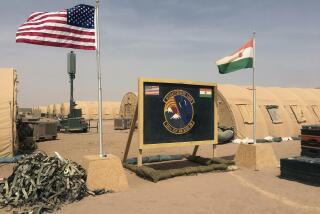Peace Finally Knocks Serbs Off Their Perch
- Share via
MT. VIS, Bosnia-Herzegovina — Bosnian Serb soldiers have not budged from this mountaintop for more than 1,000 days, using it as a strategic command center for fighting in the contested Tuzla valley below.
The rebel soldiers have repelled ground attacks by Bosnian government troops, survived tank fire from U.N. peacekeepers and withstood two punishing aerial assaults by NATO warplanes, which blitzed the forested peak with a dozen bombs in September and October.
“We have been able to control the whole area from here,” said Zoran, the Bosnian Serb commander of the pummeled outpost, which has a bird’s-eye view of the Tuzla air base seven miles to the west. “We have been able to defend our people.”
What three years of war were unable to accomplish on Mt. Vis, peace brought about Wednesday. The Bosnian Serbs agreed to pack up and hand over the mountaintop to U.S. soldiers, who will convert its muddy slopes into a remote base for NATO peacekeepers patrolling the so-called zone of separation between the warring sides.
“The war is over,” Zoran told a group of visiting U.S. officers. “I am going back to my civilian life.”
About half a dozen U.S. Humvees made the tortuous journey along mud roads to the outpost for the first meeting between the departing Bosnian Serbs and their mountaintop successors.
There were cigarettes, coffee and special vodka--even jokes. But beneath the cordial veneer, each side was tense, not knowing what to expect from the other.
“This is harder than anything I ever faced at the White House,” said Maj. Bryan Roberts, who worked on the planning staffs for Vice President Al Gore and former Vice President Dan Quayle.
“I didn’t believe this was possible at first,” said Zoran, who declined to give his last name or rank. “Maybe I was a little afraid.”
The Americans were escorted to the lookout base by a husky Serbian officer who rarely cracked a smile and insisted that their Bradley fighting vehicles be left behind. The Americans obliged, but balked at a request that journalists also be excluded.
“Most media don’t fabricate stories but report what they see,” Capt. Bob Ivy, commander of the U.S. unit, lectured his Serbian hosts. “For us, it is important to have the support of our people.”
Once on top, the visitors were given a tour of the devastation caused by the North Atlantic Treaty Organization air strikes, including views of scalded treetops and mangled military fortifications. Zoran talked about casualties but offered no specifics.
“This used to be a shelter for my troops,” he told his American guests, pointing to a deep crater amid a clearing of burned trees. “We were not guilty for that.”
“The American Army is here now,” said Ivy, whose unit will be stationed on the mountain beginning Friday. “We are trying to be impartial in implementing the peace agreement.”
There was silence as the group passed the rubble. The smell of burning pine filled the air from smoldering dugouts recently set ablaze by Bosnian Serb soldiers. A small building of concrete blocks remained standing. Zoran suggested Ivy take it as his headquarters.
“It is a lucky building,” he said. “Thousands of shells have been fired, but not one has hit it. . . . We are taking our stove with us, but we are leaving plenty of firewood behind.”
The impromptu ceremony moved in an arc around the edge of the mountain, eventually settling at a picnic table covered in a blanket in a grove of pine trees. The occasional thud of a mine-sweeping team drowned out the conversation, which had turned to the basics of the peace accord negotiated in Dayton, Ohio.
Zoran asked Ivy if his troops will protect Bosnian Serbs who remain in the zone of separation, a no man’s land about a mile wide required by the agreement. Ivy promised only to step in for emergencies, leaving everyday matters to the local police.
What will happen to Mt. Vis after the Americans leave? Ivy assured Zoran it would be returned to the Bosnian Serbs.
“He promised us,” said Kico, another Bosnian Serb officer, turning to several American journalists. “You are our witnesses.”
Ivy, looking a little nervous, tried to clarify that his job was to enforce the peace deal, not make political promises. “It is not my job to give up your land,” Ivy said. “You have to negotiate now with the Muslims.”
“After a year, the war will start again,” one pessimistic Bosnian Serb soldier replied.
By midafternoon, the Americans returned to their Humvees for the trip back to their temporary camp in the shell of a meat-packing factory near the confrontation line. Once there, the officers let their guard down and compared notes about the toughest day in their new deployment.
“It was a minefield every step we took,” Ivy said. “Everything we said, there was a danger of making a mistake. Hopefully not a profound one--one that you couldn’t correct. But we all make mistakes.”
More to Read
Sign up for Essential California
The most important California stories and recommendations in your inbox every morning.
You may occasionally receive promotional content from the Los Angeles Times.











